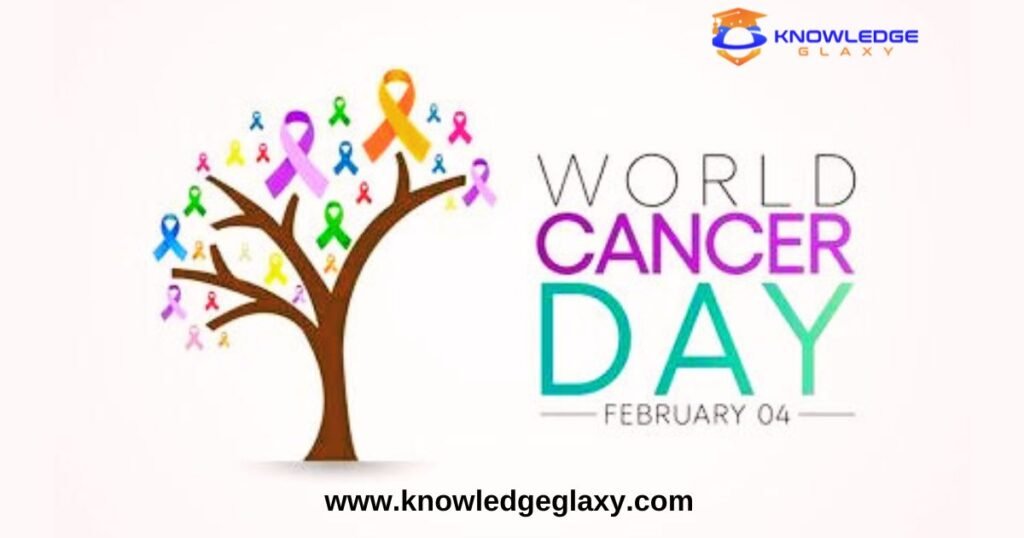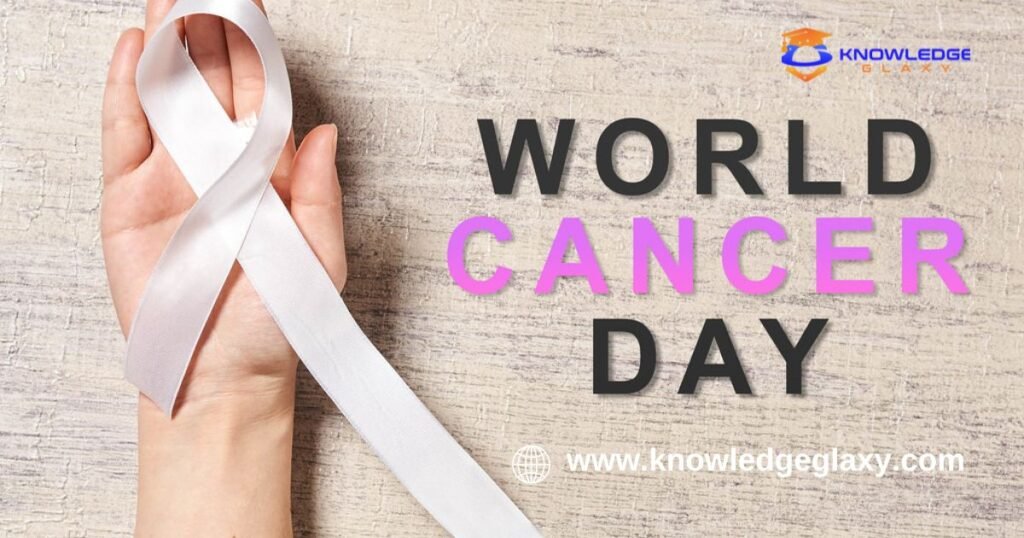World Cancer Day 2024 – History, Theme, Activities, and Ways to Observe
World Cancer Day is observed on February 4th every year to raise awareness about cancer and to encourage its prevention, detection, and treatment. This international day was started by the Union for International Cancer Control (UICC) to educate people across the globe and mobilize the support needed to fight against this deadly disease.
The first World Cancer Day was celebrated in 2004, with the primary goal to significantly reduce illness and death caused by cancer by 2020. Over the years, this day has grown into a positive movement to unite people in the battle against cancer and save millions of preventable deaths.
World Cancer Day 2024 Theme
The theme for World Cancer Day 2024 is:
“Close the Care Gap“
This thought-provoking theme draws much-needed consideration to the gap in cancer care and cancer patients’ struggles to access treatment and supportive care. Millions of people are unable to obtain life-saving prevention, early detection, and treatment services. In low and middle-income countries, this gap is shockingly wide.
Read More: Cancer Prevention

The care gap also exists between population groups in higher-income environments. Patients from disadvantaged communities suffer poorer outcomes. World Cancer Day 2024 campaigns for equal and universal access to cancer care to save more lives and make societies fairer.
Activities for Students on World Cancer Day
Here are some activity ideas for students to observe this day in schools and colleges:
- Arrange a cancer awareness rally in your neighborhood with awareness posters and placards
- Organize a seminar on common cancers, their prevention, and symptoms
- Conduct poster-making, slogan-writing, and quiz competitions on the topic
- Invite cancer doctors, survivors, or specialists to give a talk
- Screen informative documentaries on cancer
- Raise funds by setting up stalls for cancer charities
- Share stories of well-known personalities who fought cancer
World Cancer Day Events and Campaigns
Various events and campaigns take place globally around World Cancer Day 2024 to unite people for a common goal. Some major initiatives are:
- UIC C’s ‘Close the Care Gap’ themed campaign with over 400 partners engaged to spread awareness
- ‘I Am and I Will‘ – a special activity where people share their commitment to fighting cancer
- ‘Knowledge Sharing Sessions‘ bring patients, caregivers, and oncologists together
- ‘Light up for Cancer’ initiative where famous landmarks are lit up in orange lights
- Cancer-focused marathons and fundraisers
- Local authorities organizing free medical checkups and cancer screening camps
- Awareness seminars in educational institutes and corporate offices with experts
Ways You Can Observe This Day
You too can join in spreading awareness this World Cancer Day 2024. Here are some impactful things you can do:
- The UICC ‘I Am and I Will’ activity to share your personal pledge
- Donate to or volunteer with local and global cancer charities
- Gift your time to help cancer patients undergoing treatment
- Run a social media campaign to spread key messaging about cancer
- Use World Cancer Day Twitter hashtags #WorldCancerDay #IAmandIWill
- Host a workout fundraiser with entry proceeds going to cancer causes
- Encourage family and friends to get preventive health checks done
- Educate those around you on signs, symptoms, and screenings for early detection
- Use orange color in outfits, decor, or lighting to symbolize support
Cancer – Signs, Symptoms, and Screening
Cancer can affect almost any part of the body, with the most common types including breast, skin, lung, colon, prostate, and lymphoma. Some general signs and symptoms are:
- Fatigue
- Unexplained weight loss
- Pain
- Skin changes such as yellowing, darkening or redness
- Changes in bowel or bladder function
- Unusual bleeding or discharge
- Persistent lumps, coughs, or difficulty swallowing
Getting screened regularly before any symptoms show up plays a big role in preventing and detecting many cancers in early more treatable stages.
Self-exams, scans, scoped exams, and blood tests help find issues before they progress into something more serious. All adults should know which screening tests are recommended by health organizations based on their age, gender, family history, and other risk factors.
Speaking to your doctor is the best way to determine an appropriate customized screening schedule unique to your health profile and background.
The Fight Against Cancer Continues
In recent years, massive strides have been made globally in cancer research, diagnosis techniques, and modern treatment options. Despite this, the disease continues to claim far too many lives around the world.
Observing World Cancer Day unites people to champion the fight against this devastating illness. It aims to mobilize countries and communities into action, spreading awareness and bridging the current gaps in cancer care.
Small consistent efforts by individuals, organizations, and governments will add up to drive change. Together, we can reduce the global burden of cancer.

Common Cancers – Causes, Prevention, and Treatment
Some of the most prevalent cancers globally are breast, lung, colon, prostate, and skin cancers. Understanding their common causes and early signs better equips us to lower risk.
Breast Cancer
Breast cancer makes up about 25% of all new cancer cases in women worldwide. Some factors that can increase breast cancer risk include:
- Family history
- Inherited gene mutations
- Reproductive history
- Lifestyle factors
- Radiation exposure
- Hormone therapy
Early detection gives the best survival rates, so monthly self-exams to feel for lumps plus regular mammograms are essential after age 40.
Lung cancer has one of the highest mortality rates of all major cancers. Its leading cause is long-term tobacco smoking, causing nearly 9 out of 10 lung cancers. Other risk factors are:
- Secondhand smoke
- Radon gas exposure
- Occupational exposures
- Air pollution
Quitting smoking, avoiding secondhand smoke, radon testing, and wearing protective equipment around hazardous substances are key to prevention.
Colorectal Cancer
Colorectal cancer begins in the colon or rectum. Major contributors to developing it include:
- Age
- Family history
- Inflammatory intestinal conditions
- Poor diet
- Obesity
- Alcohol and tobacco use
Screening tests like colonoscopies detect and remove precancerous growths, preventing nearly 90% of colorectal cancers.
Prostate Cancer
Prostate cancer develops mainly in older men. Factors that raise chances of getting it:
- Age
- Family history
- Race
- Diet and lifestyle
Medical check-ups including prostate-specific antigen (PSA) blood tests and digital rectal exams (DRE) are important to diagnose issues early on.
Skin Cancers
Too much ultraviolet exposure from sunlight and tanning increases skin cancer likelihood. Using sun protection and avoiding tanning beds reduces chances.
Self-exams plus annual checkups help spot suspicious moles and lesions in the initial stages when they can be dealt with effectively.
Advancements Improving Cancer Outcomes
Cancer diagnosis and treatment have improved vastly in the past decade, leading to a better quality of life and outlook for many patients.
Notable innovations include:
- Targeted therapy drugs that attack cancer cells while causing less harm to normal ones
- Immunotherapy boosts the body’s own defenses to beat cancer
- Use of nanotechnology for earlier more accurate detection
- Increased minimally invasive robotic and laser surgeries for cancers
- Enhanced radiation therapies like proton beam therapy
- Liquid biopsies detecting cancer DNA in the bloodstream
- Genomic testing to customize treatment plans based on tumor specifics
- Supportive care improvements to better handle side effects
The promise of newer precision medicine approaches brings much hope, translating into an overall decline in mortality rates.
The Road Ahead
Despite progress made, cancer continues to be one of the leading causes of death globally, indicating there is still a long way to go.
Observing World Cancer Day unites people and organizations to propel the fight against this group of diseases. It promotes education, spreads awareness, raises funding, and demands political commitments.
Working together is key to accelerating the implementation of lifesaving strategies and technologies. Through everyday acts, we can contribute to bringing down risk factors, making screenings routine, improving treatments, and meeting care needs.
Steady evidence-based action will diminish the global burden of cancer during our lifetime.

Coping With a Cancer Diagnosis
Receiving a cancer diagnosis can be very distressing. Adjusting to the physical and emotional effects of cancer treatment while facing an uncertain future is incredibly tough.
It helps to have realistic expectations and appropriate coping techniques in place. This makes the journey more manageable.
Common Reactions
Many different reactions are normal when diagnosed with cancer:
- Shock and disbelief
- Fear about the future
- Anger at the situation
- Guilt about lifestyle factors
- Sadness and distress
- Anxiety over treatment
- Feeling a lack of control
- Isolation and loneliness
Coping Tips
Some positive coping methods include:
- Learning about your cancer and treatment options
- Expressing feelings openly with loved ones
- Doing activities that comfort, relax, and restore energy
- Setting small doable goals to regain a sense of control
- Joining local or online support groups to share experiences
- Trying relaxation techniques like meditation, yoga, or massage
- Saving time and energy by asking others for practical help
- Avoiding excess alcohol consumption or unhealthy habits
Seeking Professional Help
Consulting mental health experts like psychologists, therapists, or psychiatrists to obtain medications, counseling or coping advice is very beneficial when emotions feel overwhelming.
Your oncology team may have experts they can connect you with. Support is essential throughout treatment as well as survivorship.
Importance of a Positive Outlook
Keeping a hopeful stance does not change the reality of a cancer diagnosis but can improve the quality of life on the journey. Studies show that:
- Optimistic people report better physical and mental well-being.
- Positive thinking boosts motivation to keep fighting.
- Lower stress levels enhance immune function and healing.
- A good outlook increases satisfaction with medical care.
Having realistic hope and confidence in one’s inner strength aids the healing process tremendously.
Conclusion
A cancer diagnosis triggers deep emotions and changes one’s outlook on life. Practicing self-care, embracing support systems, expressing feelings healthily, and maintaining positivity can help people face their situations.
With advancing modern medicine, many are living longer post-cancer treatment despite the difficulties faced. Taking things step by step and tapping resilience ultimately leads people out the other side as survivors rather than victims.

Read More: World Cancer Day
FAQs
Q: When is World Cancer Day?
A: It is observed annually on 4th February.
Q: Who started World Cancer Day?
A: It was founded in 2000 by the Union for International Cancer Control (UICC) to raise worldwide awareness and improve education about the disease.
Q: What is this year’s theme for World Cancer Day 2024?
A: The theme for World Cancer Day 2024 is ‘Close the Care Gap’. It highlights the large gaps in cancer care, treatment, and services experienced by patients globally.
Q: How can I participate in World Cancer Day events?
A: You can participate by donating or fundraising for cancer charities, volunteering at cancer hospitals, joining awareness rallies, sharing social media posts, or wearing World Cancer Day symbols.
Q: What activities can students do on World Cancer Day?
A: Students can organize poster contests, screen health documentaries in schools, conduct cancer quiz competitions, set up educational stalls, or participate in fundraising events for cancer.
Q: What are some common cancers in men and women?
A: Common cancers differ between genders but include lung, breast, colorectal, prostate, and skin cancers as the most prevalent worldwide.
Q: What increases someone’s risk of developing cancer?
A: Age, family history, lifestyle factors like smoking and sun exposure, environmental toxins, chronic infections, poor diet, inactivity, and excessive alcohol raise cancer risk substantially.
Q: How can people prevent or lower their cancer risk?
A: Preventive measures like regular screenings, vaccines against infectious diseases, avoiding tobacco, eating healthy, maintaining weight, exercising, limiting alcohol, and knowing family history can reduce the odds of getting cancer.






